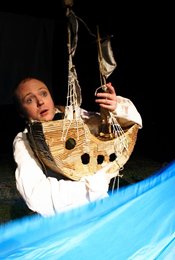Bravo Alice Coghlan and Wonderland for taking on Jonathan Swift! Gulliver’s Travels holds, as ‘twere, a highly distorted, yet revealing, mirror up to human nature, as the hero confronts his image in miniature, in magnification, in bestiality and noble rationality. Coghlan joins a growing band of writers who seek to render a prose work (pitched at the eye and imagination of the individual reader) for the stage.
Swift chose to use the traveller’s tale as the vehicle for a complex array of thoughts – philosophical, political, morbidly human – and Coghlan tries to encompass a great deal of this, but she gets caught in the Swiftian 'Catch 22' – is this a children’s story (No, not really, in spite of all the Disneyish preoccupation with the little people) or a serious treatise on the human condition? This was never quite resolved at the Mermaid. The performance was in early evening – kid friendly – but it stretched to over two hours – not so friendly. There were attractive puppets and economical, eye-catching effects to hold the youthful gazers – but there was also an earnest attempt to deal with more adult issues, primarily the body politic and the body sexual.
So the target audience is not clearly identified. Nor is the question of language, which veers from political and courtly formality (much easier to absorb on the page) to some inappropriate contemporary jocularity (someone is called a “twit” and Gulliver admits to owning a “John Thomas”). The formal dialogue prompts a mannered form of acting; there is not enough courage to go the whole hog with the vernacular and give real flesh and blood to Gulliver and his confusion about his humanity. The style keeps the audience at a distance.
The shifting physical scales is problematic, not so much in Lilliput, where the miniaturisation by puppet is effective; the gigantic is less convincing. While Gulliver manages to extinguish the fire in Lilliput by some decorously-staged pishing, the production falls short of conveying his horror in Brobdingnag at the grossness of the flesh as he is pressed up against the gigantic, spotty, pimpled, freckled breast of the empress.
 Coghlan has opted for an impressive array of techniques and devices: a minimalist ship, billowing fabric for the waves, small puppets (beautifully executed), a furry coracle, shadow puppets; projections, dry ice on demand, and, with light and sound, some tentative striving for atmosphere. But the production gets cluttered with the effects so that the audience finds it hard to sustain the suspension of its disbelief. If only the aspiration of the piece could have been matched with more technical development and more rehearsal.
Coghlan has opted for an impressive array of techniques and devices: a minimalist ship, billowing fabric for the waves, small puppets (beautifully executed), a furry coracle, shadow puppets; projections, dry ice on demand, and, with light and sound, some tentative striving for atmosphere. But the production gets cluttered with the effects so that the audience finds it hard to sustain the suspension of its disbelief. If only the aspiration of the piece could have been matched with more technical development and more rehearsal.
And it is hugely ambitious: Coghlan asks a small ensemble to take the audience through several voyages, as well as handling a lot of technical activity. There is some basic choreography and singing, a bit hard on the larynx and on the ear, but there is a growing confidence in the performances and the last episode, when the scale is human, where Gulliver encounters his nemesis in the form of the feral and faecal Yahoos, and his ideal in the form of the noble, equine Houyhnhnms, works best. This episode is shorn of technical complexity. There’s no problem of scale; fun-furry nakedness conveys the base yahoos; a variation on the Equus style gives us some very passable Houyhnhnms. Dung is flung and we get the message about the female yahoo’s sexual infatuation with Gulliver - but it falls short of the rancid bestiality of the original.
Gulliver’s Travels is about self-discovery and self-disgust. The progression of the linear narrative is revealed only at the end; the bleakness of Swift’s vision of humantity is well conveyed by the scene where Gulliver, back in the bosom of his family, cannot bear the touch, smell or sight of his wife and children and resorts to hanging out in the stable. The final moment is of the horses/Houyhnhnms exchanging quizzical glances. As the Wonderland company faces into its tour in the new year, it might benefit from a re-interrogation of both text and production. There is much to build upon.
Derek West